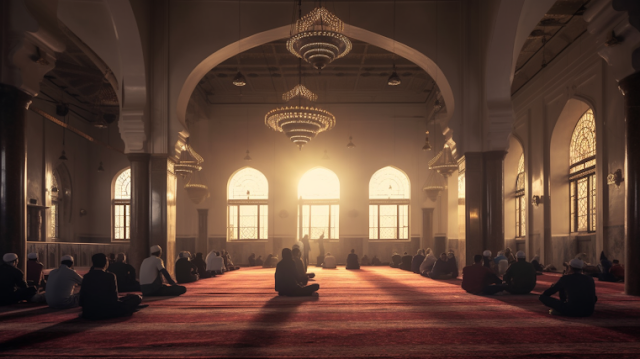In Islam, the concept of the soul plays a central role in understanding one's purpose in life and the journey after death. The soul is believed to be a person's essence and intricately connected to the body and the Creator. Islamic teachings emphasize the importance of purifying and nurturing the soul to attain spiritual growth and closeness to Allah.
This article will explore the mysteries of the soul in Islam, including its various types, the journey after death, the relationship between the soul and the body, the significance of purification and prayer, the secrets of the heart, the connection with the Creator, and the mystical aspects of the soul in Sufism.
1. Understanding the Concept of the Soul in Islam
The Islamic Perspective on the Soul
In Islam, the soul is integral to a human being's existence. It is believed to be created by Allah before the creation of the physical body. The soul is viewed as a non-material entity that gives life to the body and is the source of consciousness and thought.The Different Types of Souls in Islam
Islam recognizes several types of souls. The first is the Nafs al-Ammara, the soul that constantly incites a person towards evil and sinful behavior.2. The Journey of the Soul After Death
The Stages of Afterlife According to Islam
Islam teaches that the soul embarks on a journey toward the afterlife after death. The trip involves several stages, beginning with the questioning of the deceased in the grave by two angels, Munkar and Nakir. The righteous will experience a peaceful grave, while the sinners will suffer punishment.The Role of Angels in the Journey of the Soul
Angels play a significant role in the journey of the soul. They act as guardians, recording the person's deeds and guiding them toward either paradise or hell. On the Day of Judgment, the angels will also play a role in determining the person's fate, leading them towards salvation or punishment.3. The Connection Between the Soul and the Body
The Concept of Fitrah in Islam
Islam emphasizes maintaining a balance between the soul and the body. The Fitrah is an innate human disposition to worship and seek Allah's guidance. It is believed that the Fitrah helps to keep the soul connected to Allah, even as the body is preoccupied with the material world.The Impact of Physical Actions on the Soul
Islam teaches that physical actions can have a profound impact on the soul. Good deeds and positive actions lead to spiritual growth and purification of the soul. Conversely, immoral behavior and sinful actions can lead to the corruption and degradation of the soul.4. The Importance of Purification of the Soul
The Concept of Tazkiyah in Islam
Tazkiyah refers to the purification of the soul in Islam. It is an essential aspect of Islamic spirituality and involves removing impurities from the soul and cultivating positive qualities. Tazkiyah is a lifelong journey toward spiritual growth and closeness to Allah.The Different Means of Purification in Islam
There are various means of purifying the soul in Islam. These include performing acts of worship, such as prayer and fasting, seeking knowledge, performing charitable acts, and engaging in self-reflection and repentance. The ultimate goal of purification is to attain greater closeness to Allah and achieve peace and tranquility within oneself.5. The Role of Prayer and Meditation in Nurturing the Soul
The Power of Salah in Islam
Salah, or prayer, is one of the fundamental pillars of Islam. It is an act of worship that helps believers to connect with their Creator and nurture their souls. Muslims are required to perform five daily prayers, which remind them of their submission to Allah (SWT). It helps them to be mindful of their actions and seek forgiveness for their sins. Salah is a physical act of worship and a spiritual dimension that nourishes the soul.The Benefits of Meditation for the Soul
Meditation is another powerful tool that can help nurture the soul. In Islam, meditation is often referred to as "Muraqaba." It involves focusing the mind on the remembrance of Allah (SWT) and seeking guidance. Meditation can help reduce stress and anxiety and promote inner peace. It allows individuals to connect with their souls and align their actions with their beliefs. Regular meditation can help individuals become more mindful and improve their overall well-being.6. The Secrets of the Heart in Islam
The Importance of Having a Pure Heart in Islam
In Islam, the heart is considered the seat of the soul. It is the place where faith resides and where all actions originate. Therefore, a pure heart is essential for spiritual growth and soul nurturing. A pure heart is free from negative emotions such as envy, hatred, and jealousy. It is filled with love, compassion, and kindness. Prophet Muhammad (PBUH) said, "Verily, Allah does not look at your faces or wealth, but He looks at your hearts and your actions."The Different States of the Heart in Islam
In Islamic tradition, the heart can be in different states depending on the level of faith and purification. Islam has three primary forms of nature: The first stage is the diseased heart, filled with evil and negativity. The second stage is the heart, which recognizes its disease and seeks to purify itself. The third state is the heart, which is pure and filled with the love of Allah (SWT). It is the state that all believers should strive for.7. The Relationship Between the Soul and the Creator
The Concept of Tawhid in Islam
Tawhid is Islam's central concept and refers to Allah's oneness (SWT). Islam teaches that Allah (SWT) creates everything in the universe and is connected to him. Therefore, Islam's relationship between the soul and the Creator is fundamental. Muslims believe nourishing the soul can strengthen their relationship with Allah (SWT) and ultimately attain paradise.The Significance of Knowing One's Creator
Islam emphasizes the importance of knowing one's Creator. Believing in Allah (SWT) and understanding his attributes can help individuals to develop a stronger connection with him. Knowing Allah (SWT) can also provide individuals with guidance and wisdom, which they can use to navigate life's challenges. The Quran says, "Indeed, in the remembrance of Allah, do hearts find peace."8. The Mystical Aspects of the Soul in Sufism
The Relationship Between Sufism and the Soul
Sufism is a spiritual dimension of Islam that focuses on purifying the soul and attaining closeness to Allah (SWT). Sufis believe that the soul is the essence of human beings and is connected to Allah (SWT) mystically. Sufism emphasizes the importance of self-examination, meditation, and remembrance of Allah (SWT) to communicate with the soul.The Practices of Sufis to Connect with Their Soul
Sufis use various practices to connect with their souls and attain spiritual enlightenment. These practices include meditation, recitation of Allah's (SWT) names, and zikr (remembrance of Allah). Sufis also believe in the power of love and devotion to Allah (SWT) and his Prophet (PBUH) to strengthen their connection with their Creator.Frequently Asked Questions
What is the Islamic concept of the soul?
Islamic teachings hold that every human possesses a soul, which is believed to be the essence of a person. It is seen as the source of life and consciousness and is intricately connected to the body and the Creator.What happens to the soul after death?
According to Islam, the soul begins a journey to the afterlife after a person dies. The soul is believed to be judged according to the person's deeds in life, and the soul's ultimate destination is either paradise or hell.What is the significance of purifying the soul in Islam?
The purification of the soul, known as Tazkiyah, is a crucial aspect of Islamic teachings. It involves removing negative traits and tendencies from the heart and soul and cultivating positive qualities. This process is seen as essential for spiritual growth and closeness to Allah.What is the role of Sufism in understanding the soul in Islam?
Sufism is a mystical branch of Islam that emphasizes the soul and its connection with the Creator. Sufis believe that by purifying the soul and developing a deeper awareness of the spiritual realm, one can attain spiritual enlightenment and closeness to Allah.References
- The Mysteries of the Soul in Islam by Abu Bilal Mustafa al-Kanadi - https://www.kalamullah.com/mysteries-of-the-soul-in-islam.html
- The Spiritual Cure: An Explanation of Surah Al-Fatihah prepared by Abu Rumaysah - https://www.kalamullah.com/spiritual-cure.html
- The Book of Assistance by Imam al-Haddad, translated by Mostafa al-Badawi - https://www.goodreads.com/book/show/482041.The_Book_of_Assistance
- The Alchemy of Happiness by Imam Al-Ghazali, translated by Claud Field - https://www.goodreads.com/book/show/80481.The_Alchemy_of_Happiness
- The Heart of Islam: Enduring Values for Humanity by Seyyed Hossein Nasr - https://www.goodreads.com/book/show/108757.The_Heart_of_Islam
- The Quran - https://quran.com/



